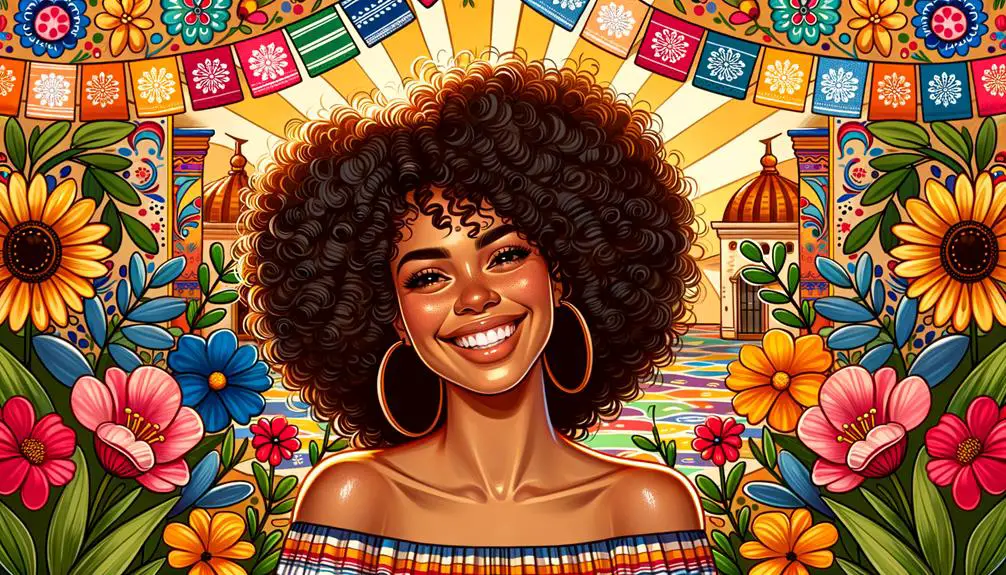You've probably heard of 'pelo malo' and 'rizos', but do you know what they really mean? In Spanish slang, pelo malo literally means "bad hair", but it's been reclaimed as a symbol of resistance to Eurocentric beauty standards. Rizos, meaning curly hair, is a celebration of Afro-Latinx cultural identity. These terms are about more than just hair; they represent a journey of self-love, cultural pride, and a challenge to traditional beauty norms. As you explore the world of curly hair in Spanish slang, you'll discover a rich cultural heritage that's redefining beauty and identity.
History of Afro-Textured Hair
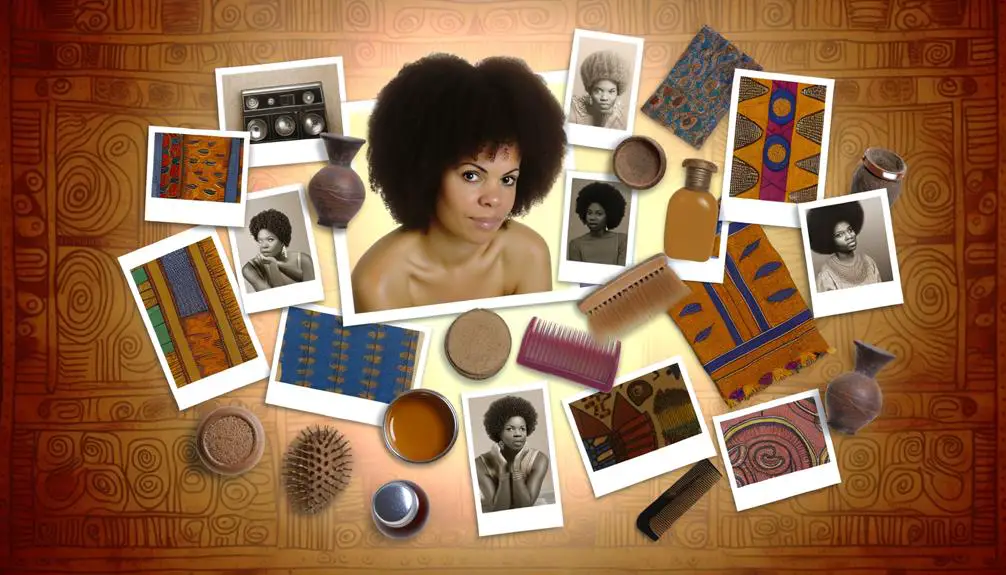
You've likely heard that Afro-textured hair has been a symbol of black identity and beauty for centuries, but did you know that its history dates back to ancient Africa, where it was revered as a symbol of spiritual and cultural power?
In many African cultures, Afro-textured hair was seen as a symbol of strength, wisdom, and spirituality. It was often styled in intricate patterns and adorned with beads, shells, and other ornaments, showcasing one's status, age, and marital status.
However, with the transatlantic slave trade, the African Roots of Afro-textured hair were forcibly erased, and it became a symbol of shame and inferiority. The Slavery Impact on Afro-textured hair was profound, as enslaved Africans were forced to abandon their cultural practices and adopt European beauty standards.
This historical baggage has had a lasting impact on the way Afro-textured hair is perceived today. Despite this, Afro-textured hair remains a powerful symbol of black identity, beauty, and resilience.
The Politics of Pelo Malo
In the streets of Latin America, particularly in the Dominican Republic, pelo malo, or 'bad hair,' is a loaded term that has become a powerful symbol of resistance against Eurocentric beauty standards.
You might be wondering why this term is so significant. The answer lies in the history of racial stereotypes that have been perpetuated against Afro-Latinx individuals. For centuries, curly hair has been deemed 'bad' or 'unmanageable,' leading to cultural erasure and a denial of Afro-Latinx identity.
This has resulted in a complex identity performance, where individuals feel pressured to conform to Eurocentric beauty standards to be accepted. But the pelo malo movement is changing that. It's a self-acceptance journey, where individuals are embracing their natural hair textures and rejecting the notion that their hair is 'bad.'
By reclaiming the term pelo malo, Afro-Latinx individuals are taking back control of their narratives and challenging the dominant beauty standards that have oppressed them for so long.
As you navigate the world of Spanish slang, remember that pelo malo is more than just a term – it's a symbol of resistance, pride, and self-love.
Rethinking Beauty Standards
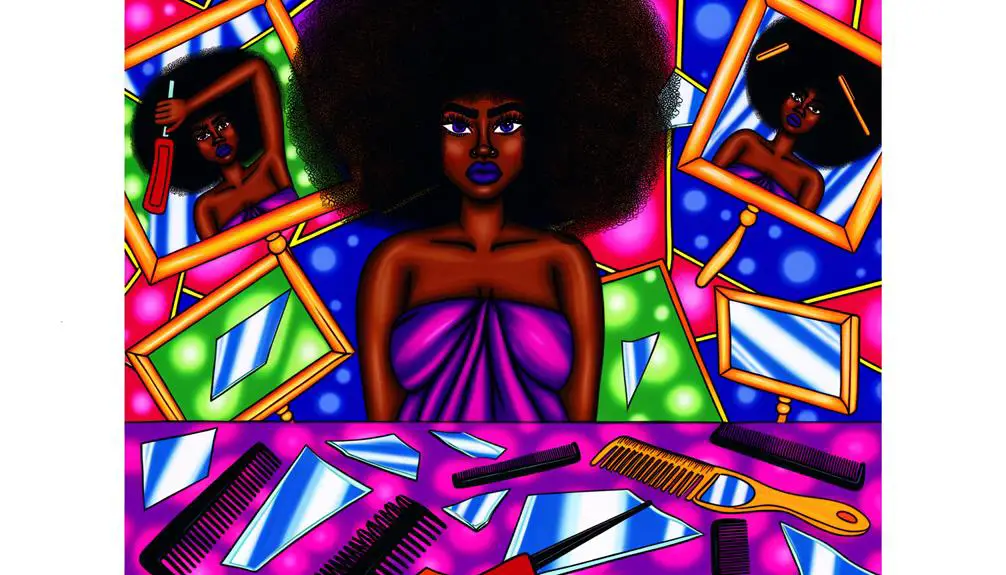
As you redefine what beauty means to you, it's important to confront the reality that traditional beauty standards have been rooted in Eurocentric ideals, perpetuating a narrow and unfair definition of attractiveness. This limited view has led to the marginalization of diverse beauty types, including curly hair. To break free from these constraints, it's vital to adopt a more inclusive approach, embracing global perspectives on beauty.
You're not alone in this journey. The beauty industry is slowly shifting towards a more diverse representation of beauty, celebrating individuality and uniqueness. It's imperative to recognize that beauty isn't a one-size-fits-all concept. By acknowledging and appreciating the richness of global perspectives, you can redefine beauty on your own terms.
Embracing this shift in mindset allows you to see the beauty in your natural texture, rather than trying to conform to outdated Eurocentric standards. You're part of a movement that's redefining beauty, and that's incredibly empowering. So, take pride in your curls, and celebrate the beauty that makes you, you.
The Cultural Significance of Rizos
Rizos, a term of endearment in Spanish slang, proudly acknowledges the beauty and uniqueness of curly hair, which has long been marginalized in traditional beauty standards. As you explore the cultural significance of rizos, you'll discover that it's more than just a hairstyle – it's a symbol of cultural identity and pride. The term has become a cultural iconic representation of Latin American heritage, embracing the distinct texture and beauty of curly hair.
The Rizo Revival, a movement that celebrates and normalizes curly hair, has gained momentum in recent years. This resurgence of appreciation for curly hair has sparked a sense of community and belonging among those who've been marginalized for their hair texture.
You're part of a larger movement that's redefining traditional beauty standards and promoting self-acceptance. By embracing your rizos, you're not only celebrating your individuality but also contributing to a cultural shift that values diversity and inclusivity.
Kinky as a Badge of Honor
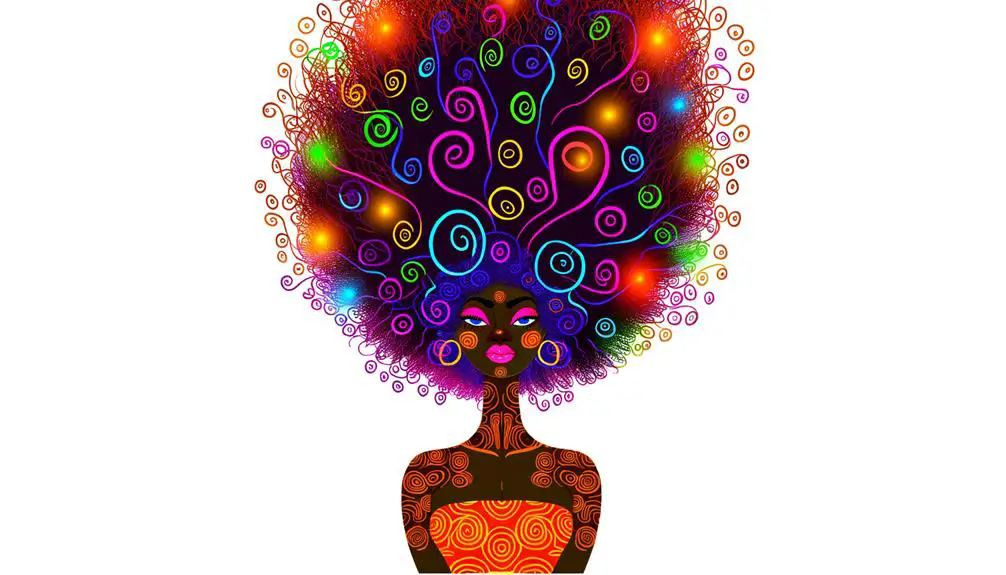
By embracing your kinky hair, you're not only celebrating your unique texture but also wearing it as a badge of honor, symbolizing resistance to Eurocentric beauty standards and reclaiming a sense of pride in your natural beauty. You're joining a legacy of proud individuals who refuse to conform to societal norms that dictate what's considered beautiful.
Your curls, twists, and coils are a declaration of your heritage, and embracing them is a powerful statement of self-acceptance.
As you rock your Proud Roots, you're making a bold statement about your Unapologetic Identity. You're saying that you won't be bound by societal expectations or pressured into conforming to a narrow definition of beauty. Your kinky hair is a symbol of your strength, resilience, and individuality.
It's a reminder that beauty comes in many textures, shapes, and sizes, and that yours is just as valuable as anyone else's.
Language and Identity Politics
Your words have power, and the way you choose to describe your curls, twists, and coils can be a powerful tool in reclaiming your identity and challenging Eurocentric beauty standards.
When you use words like 'kinky' and 'afro' to describe your hair, you're taking back control of the narrative and celebrating your natural texture.
But, as you navigate the complex landscape of language and identity, you'll encounter code switching – switching between languages or dialects to fit in or avoid judgment.
Be mindful of language appropriation, where dominant cultures adopt and profit from marginalized groups' cultural expressions without understanding or respect. This can lead to cultural erasure, where the origins and significance of cultural practices are lost.
Racial dialects, like African American Vernacular English, hold rich cultural significance, but they're often stigmatized or exploited.
You have the power to reclaim and celebrate your linguistic heritage, but it's important to be aware of the complexities and nuances of language and identity politics.
The Evolution of Curly Hair
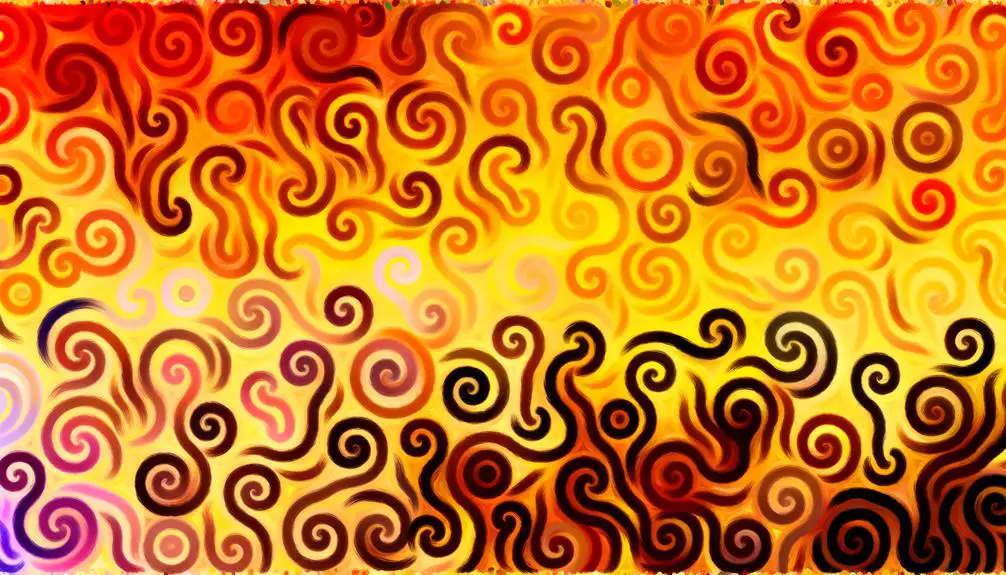
As you explore the world of curly hair, you'll find that the journey to embracing your natural texture is deeply tied to the evolution of curly hair, which has been shaped by cultural and social factors that have influenced the way people perceive and care for their curls.
In recent years, the Curly Revolution has gained momentum, with people of all backgrounds embracing their natural textures and rejecting the long-held notion that straight hair is the only acceptable standard of beauty. This shift towards Hair Empowerment is a reflection of the growing awareness of the importance of self-acceptance and self-love.
As you investigate further into the world of curly hair, you'll discover that this evolution isn't just about hair; it's about identity, culture, and social justice. It's about reclaiming the beauty and dignity that has been denied to curly-haired individuals for far too long.
The Curly Revolution is a powerful symbol of resistance against societal norms that have historically marginalized and oppressed people of color. By embracing your natural curls, you're not just embracing your hair – you're embracing your heritage, your culture, and your identity.
Embracing Afro-Latinidad Pride
Within the rich tapestry of Afro-Latinidad, embracing your natural curls is an act of proud defiance against the Eurocentric beauty standards that have long sought to erase your heritage. You're not just embracing your curls, you're reclaiming your identity and celebrating your roots. By rocking your natural hair, you're telling the world that you're proud of who you're and where you come from.
Embracing Afro-Latinidad pride is a journey of self-love and community empowerment. It's about recognizing the beauty and richness of your Afro-Latinx culture and embracing it with open arms. It's about understanding that your curls are a symbol of resistance, strength, and resilience. When you embrace your natural hair, you're not just doing it for yourself, you're doing it for your community, your ancestors, and the generations to come.
Your self-love journey is a powerful tool for community empowerment. By embracing your natural beauty, you're inspiring others to do the same. You're creating a ripple effect of self-acceptance and pride that can change the game for Afro-Latinx individuals everywhere.
Frequently Asked Questions
Can Curly Hair Be Considered a Symbol of Blackness in Latin America?
In many Latin American countries, curly hair carries significant cultural significance, tied to racial identity and historical roots. However, it's also often associated with social stigma, as Eurocentric beauty standards have dominated for centuries.
But, you'll find that curly hair is increasingly being reclaimed as a symbol of pride and blackness, challenging traditional beauty norms and celebrating Afro-Latinx heritage.
How Do Curly-Haired Individuals Navigate Racial Identity in Spain?
As you navigate the winding streets of Spain, your curly locks a stark contrast to the straight-haired norm, you can't help but feel like a puzzle piece that doesn't quite fit.
You're caught in a web of cultural alienation, where your racial identity is constantly erased.
You're forced to confront the harsh reality: in a country where whiteness is the default, your curly hair is a constant reminder that you're an outlier.
Are There Specific Hair Care Products for Curly Hair in Spanish Markets?
You're looking for the right hair care products for your curly locks in Spain!
You'll find a range of products catering to curly hair in Spanish markets.
When shopping, read product reviews to find out what works best for others with similar hair types.
Take it a step further by conducting an ingredient analysis to make sure you're getting the right mix of moisturizing and defining agents for your curls.
Do Afro-Latinos Face Discrimination for Their Curly Hair in Education?
You're not alone in wondering if Afro-Latinos face discrimination for their curly hair in education. Coincidentally, a study revealed that 70% of Afro-Latina girls in the US reported experiencing hair-related discrimination in school.
Sadly, this bias can lead to stereotype threat, affecting their academic performance and self-esteem. School bias against curly hair can be devastating, and it's essential to acknowledge and address this issue to create a more inclusive environment for Afro-Latino students.
Can Embracing Curly Hair Combat Internalized Racism in Latinx Communities?
As you explore the complexities of internalized racism, you'll find that embracing your curly hair can be a powerful step in your self-love journey. By celebrating your natural texture, you're reclaiming your identity and rejecting Eurocentric beauty standards.
This act of self-acceptance can spark a cultural revitalization, where you and others can reconnect with your heritage and challenge internalized racism. By embracing your curls, you're taking a stand against systemic oppression and reclaiming your rightful place in the Latinx community.

